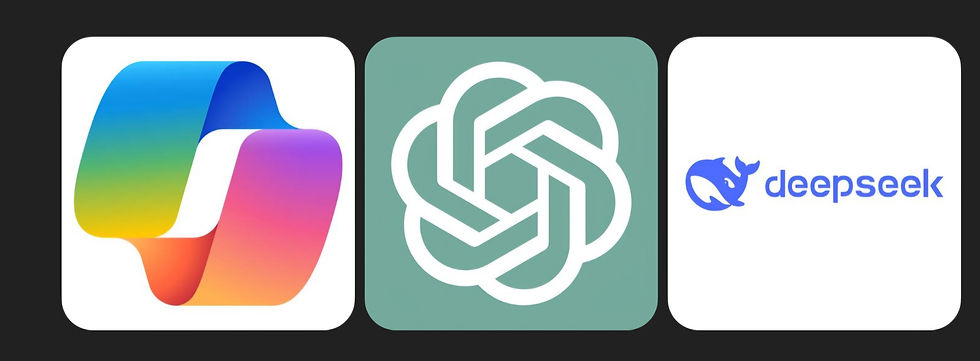Microsoft Copilot vs ChatGPT vs DeepSeek — 2025 Report on Features, Performance, Pricing, Security, and Strategic Fit
- Graziano Stefanelli
- May 23
- 4 min read


1 Introduction
Microsoft Copilot, ChatGPT, and DeepSeek stand at the centre of today’s language-model race; Copilot embeds GPT-4-class models within the Microsoft stack; ChatGPT is OpenAI’s flagship assistant, now powered by GPT-4o and heading toward GPT-5; DeepSeek delivers an open-source, cost-focused alternative built on a Mixture-of-Experts design.
_______________
2 Key features comparison
Microsoft Copilot
Deep Microsoft integration – works natively across Microsoft 365, Windows, Azure, GitHub, and Power Platform; multi-agent orchestration and low-code Copilot Tuning let teams adapt models to private data without retraining;
Task-oriented UI – Copilot surfaces directly in Word, Excel, Outlook, Teams, and VS Code instead of in a separate chat site;
Multimodal support – text, images, live documents, code snippets, and enterprise graphs can all be mixed in one prompt;
Enterprise controls – built-in data-loss prevention, audit logs, content-safety filters, EU Data Boundary, and GDPR alignment are provided.
ChatGPT
Versatile assistant – available through browser, mobile apps, and API; Free, Plus, Pro, Team, and Enterprise tiers cover everyone from hobbyists to global firms;
Rich toolset – voice interaction, image generation, Advanced Data Analysis, custom GPTs, projects folders, and canvas collaboration are bundled for paying users;
Model roadmap – GPT-4o offers low-latency multimodality now; GPT-4.1 is rolling out, while GPT-5 is publicly targeted for release in late May 2025;
Data controls – the Enterprise plan is SOC 2-compliant, keeps user traffic out of training, and allows custom retention windows.
DeepSeek
Open-source core – latest weights are released under a permissive licence, allowing self-hosting or cloud API calls;
Mixture-of-Experts engine – efficient routing delivers strong reasoning; the latest release reaches roughly eighty-nine percent pass rate on HumanEval with competitive MT-Bench scores;
Domain versatility – includes a DeepThink reasoning variant, a code-first Coder model, and balanced Chinese/English fluency;
Security debate – the combination of low cost and full model access raises questions about jailbreak resilience and geopolitical trust.
_______________
3 Performance snapshot
On the academic MMLU benchmark, Copilot paired with a tuned prompting strategy scores about eighty-nine percent, ChatGPT slightly edges it at ninety percent, and DeepSeek lands near eighty-one percent; In code-generation tests such as HumanEval, ChatGPT leads with roughly ninety-two percent, DeepSeek follows at eighty-nine percent, and Copilot (powered by GPT-4 Turbo in GitHub Copilot Pro) reaches about eighty-eight percent; Quality assessments on MT-Bench place ChatGPT around 9.3 / 10, Copilot near 8.9, and DeepSeek close to 9.0;
Real-world latency on identical H100 hardware shows Copilot averaging thirty-five tokens per second, ChatGPT forty, and DeepSeek fifty, with Copilot gaining speed from cached Microsoft Graph context, ChatGPT benefitting from new “o-series” optimisations, while DeepSeek trades speed for lower cost.
_______________
4 Pricing and availability
Copilot – Microsoft 365 Copilot add-on costs 30 USD per user per month; GitHub Copilot Pro is 10 USD for individuals and 19 USD for organisations; a pay-per-request agent mode for high-volume workloads launches in June 2025;
ChatGPT – the Free tier runs GPT-3.5; Plus 20 USD / month; Pro 200 USD / month; Team 25 – 30 USD per user per month; Enterprise pricing is bespoke;
DeepSeek – model weights are free to download; the cloud API charges roughly 0.14 – 0.55 USD per million input tokens and 2.19 USD per million output tokens; a starter subscription sits near 29 USD / month.
From a total-cost-of-ownership perspective, Copilot bundles infrastructure but creates vendor lock-in; ChatGPT’s API supports multi-cloud architectures and granular metering; DeepSeek’s self-hosted path plus low token price can undercut both at scale if a thorough security review passes.
_______________
5 Security, privacy and governance
Copilot keeps data inside the EU Data Boundary or other selected regions, turns training on user data off by default, and carries certifications such as GDPR, ISO-27001, and optional HIPAA readiness; ChatGPT Enterprise similarly disables training on customer traffic, offers region-select storage, and meets SOC 2 and GDPR requirements, though the free tier has looser retention and a higher risk of prompt leakage; DeepSeek hands full control to the deployer—data residency and model updates become the customer’s responsibility, and while openness aids inspection it also means no out-of-the-box compliance badges, plus a higher jailbreak success rate that must be mitigated by local policy and fine-grained filtering.
_______________
6 Final recommendations
Operating inside the Microsoft ecosystem? Adopt Copilot; its deep hook-ins across Office, Teams, and Azure shrink rollout time and audit overhead;
Seeking the widest creative range or consumer reach? Choose ChatGPT; it delivers the broadest skill set, the quickest multimodal upgrades, and straightforward seat-based pricing;
Building cost-sensitive or sovereign solutions? Consider DeepSeek; source-available weights, edge deployment, and sub-cent token rates are attractive, but perform rigorous red-team testing before production;
Planning a multi-assistant approach? Many firms already blend Copilot for document productivity, ChatGPT API for customer-facing chatbots, and DeepSeek for internal retrieval-augmented-generation systems; a gateway layer that abstracts vendor APIs helps keep switching costs low;
Keeping future options open? GPT-5, Copilot’s forthcoming multi-agent orchestration, and DeepSeek’s next Mixture-of-Experts cycle are all scheduled within twelve months, so negotiate contracts with quarterly exit clauses or usage-based billing to preserve flexibility.
_______________
Outlook 2025-2027
Agentic workflows, low-code customisation, and ever-cheaper Mixture-of-Experts models will continue to compress inference costs; Global regulation will tighten—full EU AI Act enforcement begins in 2026—so prioritise providers with transparent compliance roadmaps; Pricing is likely to shift from flat per-user fees toward metered token bundles as real-world usage patterns stabilise.
Straightforward take: Copilot wins on seamless workplace fit; ChatGPT wins on breadth and polish; DeepSeek wins on openness and price; Match those strengths to your specific use case and risk tolerance—then pilot quickly, measure real-world ROI, and iterate.




